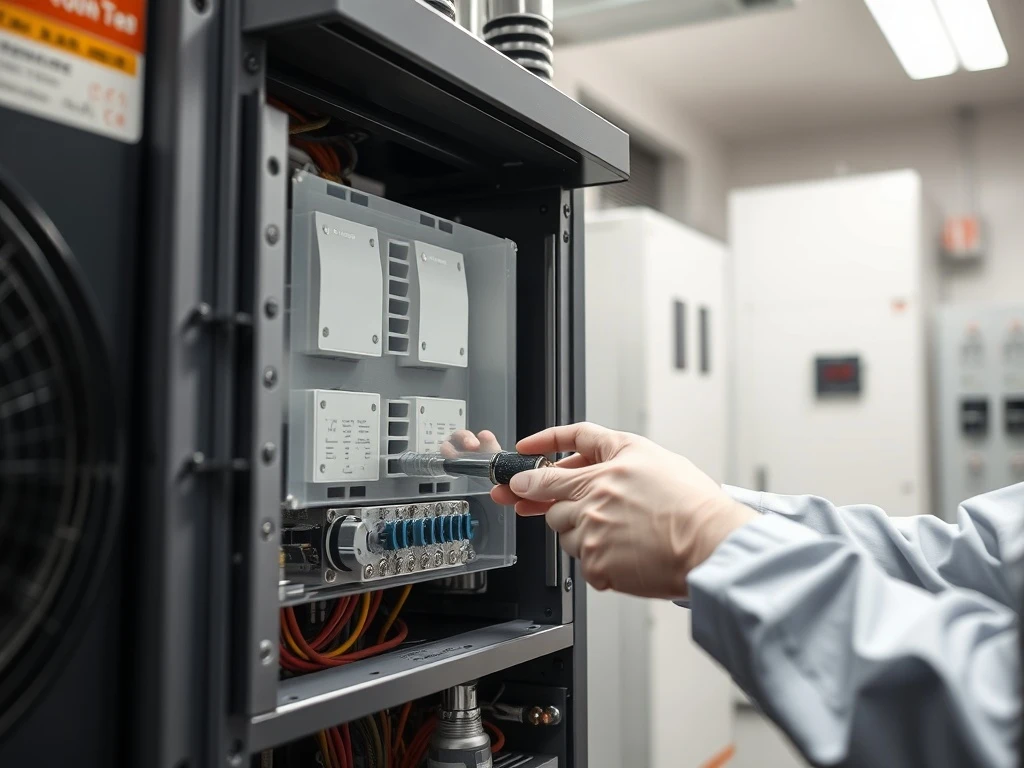Is your hot water performance not what it used to be? Perhaps your heating interface unit is making odd noises or displaying random error codes. Before assuming your entire home heating system is failing, consider that a single worn-out part could be the issue. In most cases, it comes down to faulty HIU components that need replacing, not a full system overhaul. Understanding these crucial parts can save you time, money, and a lot of frustration.
Understanding HIU Components: The Core of Your Heating System
A Heating Interface Unit (HIU) is a vital system. It controls your home’s heating and hot water, especially in apartments connected to a central boiler. Essentially, it acts as a middleman. It connects the building’s main supply to your individual flat. Inside the HIU, several key HIU components work together. For instance, the heat exchanger transfers heat. The flow sensor detects water movement. Furthermore, the pressure valve helps maintain safe water pressure. Some units also include a domestic hot water module. This module manages your tap water supply. These parts work in harmony. If even one fails, your comfort takes a significant hit.
Every single component inside your HIU plays a role. It impacts how well your heating and hot water system performs. When one part, like a flow sensor or pressure valve, begins to fail, it can throw everything off. That’s when you notice issues. These include sudden cold showers, weak water pressure, or radiators that remain cold. These are not just annoying problems. They are clear signs your HIU is not working efficiently. A small issue in a single HIU component can lead to a chain reaction of bigger problems. This happens if left unchecked. Therefore, keeping these parts in good condition is key. It ensures your home stays warm and your water runs correctly.
Common HIU Components and Their Vital Functions
Inside every thermal interface unit, a few essential parts quietly keep everything running. Understanding their functions is important for troubleshooting. Here’s a quick breakdown of the most common heating module parts and what they actually do:
- Heat Exchanger: This component transfers energy from the central system to your domestic hot water. If it starts underperforming, your water might remain lukewarm, regardless of settings.
- Flow Sensor: It detects when hot water is needed by sensing movement. If this sensor fails, your taps might stay cold even when the system is active.
- Pressure Relief Valve: This critical safety component releases excess pressure. A blocked or faulty valve can cause leaks or even damage other HIU components.
- Control Board: Think of this as the unit’s brain. It manages when and how different parts operate. Malfunctions here can lead to erratic behavior.
- Pump: The pump circulates water within the system. If it slows down or stops, heating becomes uneven or nonexistent throughout your home.
- Filters/Strainers: These protect the system by catching debris. When clogged, they reduce efficiency and can damage other HIU spares.
Each of these HIU components is integral. Their proper functioning ensures your heating system operates smoothly. Regular checks can prevent major breakdowns.
The Lifespan and Maintenance of HIU Components
The lifespan of HIU components varies greatly. Factors like water quality, usage patterns, and the initial quality of the part all play a role. For example, a heat exchanger might last 10-15 years. Conversely, a flow sensor could need replacement every 5-7 years. Pumps and valves also have their own typical lifespans. Regular maintenance is crucial for extending the life of these parts. An annual service by a qualified engineer can identify potential issues early. This proactive approach helps prevent minor faults from escalating into costly repairs. Furthermore, proper maintenance ensures the efficiency of your unit. This can lead to lower energy bills and consistent performance. Don’t overlook the importance of scheduled checks.
During maintenance, engineers typically inspect all key HIU components. They check for wear and tear. They also look for blockages and corrosion. Cleaning filters is a common task. Testing pressure valves is another routine procedure. Sometimes, a component might not be completely broken but is simply underperforming. Addressing these minor issues promptly can prevent future failures. For instance, a partially clogged filter can strain the pump. Eventually, this might lead to its premature failure. Investing in regular servicing protects your investment. It also guarantees uninterrupted heating and hot water supply.
Choosing the Right HIU Components: A Comprehensive Buyer’s Guide
Choosing the right part for your heating interface unit is not as simple as picking what “looks right.” Every system has its own unique setup. Consequently, a component that fits one model might not work for another. Always check the manual. Match the part number carefully. Double-check compatibility with your specific unit. If you are unsure, speak to a qualified heating expert or a trusted supplier. Do not guess. Wrong parts waste time, cost more in the long run, and could even cause more damage. A few extra minutes of research or asking for advice can save you a lot of stress and cold showers later on. Prioritizing genuine HIU components is always recommended.
When selecting replacement HIU components, consider the manufacturer’s recommendations. Original Equipment Manufacturer (OEM) parts are often the best choice. They ensure perfect compatibility and performance. Aftermarket parts can be cheaper. However, their quality and longevity might vary significantly. Always read reviews and verify certifications. A reputable supplier will provide detailed specifications. They will also offer clear warranty information. It’s also wise to check if the part comes with installation instructions. Sometimes, specific tools or expertise are required for fitting. Making an informed decision prevents future complications and ensures your system operates efficiently.
Professional Installation vs. DIY for HIU Components
Replacing HIU components can seem straightforward for some parts. However, many components require specialized knowledge. They also need specific tools for safe and effective installation. For example, replacing a heat exchanger or a control board is complex. It involves working with water, electricity, and gas connections. Incorrect installation can lead to leaks, electrical hazards, or even damage to the entire system. This poses a significant risk to your home and safety. Therefore, for most critical HIU repairs, professional installation is highly recommended. Qualified engineers possess the necessary training and certifications. They ensure the job is done correctly and safely. Furthermore, professional installation often comes with a warranty on the labor and the part.
While some minor tasks, like cleaning a filter, might be suitable for DIY, anything involving the unit’s core functions or safety mechanisms should be left to experts. Attempting complex repairs without proper training can invalidate warranties. It could also lead to more expensive repairs down the line. Moreover, a professional can diagnose underlying issues. They might identify other failing HIU components. This holistic approach ensures long-term reliability. Always prioritize safety and system integrity. When in doubt, call a certified heating engineer. Their expertise guarantees peace of mind and optimal performance from your heating system.
Where to Buy Genuine HIU Components
Looking to buy HIU components? Online suppliers often offer more variety and better prices. This is especially true for specific heating spares. However, local shops can be quicker and easier. They are convenient if you need immediate advice or want hassle-free returns. Whichever option you choose, make sure to check supplier reviews. Confirm they offer a clear return policy. Also, look for warranty information. Whether it’s an online heating spares supplier or a local store, go with someone reliable. This approach will save you time, money, and stress down the line. Avoid unverified sellers. Counterfeit parts are a risk. They can compromise your system’s performance and safety.
Genuine HIU components are critical for your unit’s longevity and efficiency. Reputable suppliers source directly from manufacturers. They provide authentic parts. Always ask for proof of authenticity if unsure. Be wary of prices that seem too good to be true. These often indicate lower quality or fake products. Investing in genuine parts ensures compatibility. It also guarantees that your unit operates as intended. This helps maintain energy efficiency. It also prevents premature failures. Always prioritize quality and reliability when purchasing replacement parts for your heating system.
Benefits of High-Quality HIU Components
Investing in high-quality HIU components offers numerous benefits. Firstly, it ensures optimal performance of your heating and hot water system. Genuine parts are designed to work seamlessly with your specific unit. This translates to consistent hot water supply and efficient heating throughout your home. Secondly, high-quality components boast greater durability. They are built to last, reducing the frequency of replacements. This saves you money in the long run on both parts and labor. Thirdly, superior components enhance energy efficiency. They help your HIU operate effectively, minimizing wasted energy. This leads to lower utility bills. Moreover, reliable components contribute to the safety of your system. Faulty or substandard parts can pose risks, such as leaks or electrical issues. High-quality alternatives mitigate these dangers. Finally, peace of mind is invaluable. Knowing your heating system relies on robust, dependable parts provides comfort and security. It means fewer unexpected breakdowns and a more comfortable living environment.
Choosing cheaper, inferior HIU components might seem like a cost-saving measure initially. However, it often results in frequent malfunctions and higher overall expenses. These parts might not fit correctly. They could fail prematurely. This leads to repeated repairs and inconvenience. Furthermore, they can put undue strain on other parts of your HIU. This shortens the lifespan of the entire unit. Ultimately, prioritizing quality when replacing HIU spare parts is a smart investment. It ensures your home heating system remains reliable, efficient, and safe for years to come. Don’t compromise on the components that keep your home warm and comfortable.
Conclusion: Prioritizing Quality HIU Components for Lasting Comfort
Your Heating Interface Unit is a complex system. Its efficiency and reliability depend heavily on the quality of its individual HIU components. From heat exchangers to flow sensors, each part plays a critical role in delivering consistent heating and hot water. Recognizing the signs of failing components and addressing them promptly is essential. Furthermore, choosing genuine, high-quality replacements ensures optimal performance, extends the lifespan of your unit, and contributes to significant energy savings. Don’t compromise on the heart of your home’s heating system. Invest wisely in your HIU components. This ensures lasting comfort, safety, and efficiency for your household. Regular maintenance and expert advice are your best allies in keeping your HIU running smoothly.
Frequently Asked Questions (FAQs) About HIU Components
1. What are the most common signs of a failing HIU component?
Common signs include inconsistent hot water temperature, no hot water at all, radiators not heating up properly, strange noises coming from the unit (like banging or gurgling), sudden drops in water pressure, or error codes displayed on the HIU’s screen. These often point to specific HIU components needing attention.
2. How often should HIU components be serviced or replaced?
It is generally recommended to have your HIU serviced annually by a qualified engineer. This helps identify potential issues early. While some components like filters might need cleaning more frequently, others like heat exchangers or pumps have lifespans ranging from 5 to 15 years, depending on usage and quality. Regular servicing helps predict when certain HIU components might need replacement.
3. Can I replace HIU components myself?
Some very minor tasks, such as cleaning external filters, might be manageable for a homeowner. However, replacing most critical HIU components (e.g., heat exchangers, control boards, pumps, or valves) requires specialized knowledge, tools, and safety precautions. It’s strongly recommended to hire a qualified heating engineer for these tasks to ensure safety and proper functionality.
4. Why is it important to use genuine HIU components?
Using genuine or OEM (Original Equipment Manufacturer) HIU components ensures perfect compatibility with your specific unit. This guarantees optimal performance, efficiency, and safety. Non-genuine parts might not fit correctly, could fail prematurely, or even cause damage to other parts of your HIU, potentially invalidating warranties.
5. How can I improve the lifespan of my HIU components?
Regular annual servicing by a professional is the most effective way. This includes cleaning filters, checking for leaks, ensuring correct pressure, and monitoring component wear. Maintaining good water quality (e.g., through inhibitors or water softeners if recommended) can also prevent scale buildup and corrosion, which are detrimental to many HIU components.
6. Where can I find a reliable supplier for HIU spare parts?
You can find reliable suppliers online through specialized heating and plumbing e-commerce sites, or locally at reputable heating and plumbing supply stores. Always check customer reviews, ensure they offer warranties, and verify their return policies. Prioritize suppliers known for providing genuine HIU components.




















